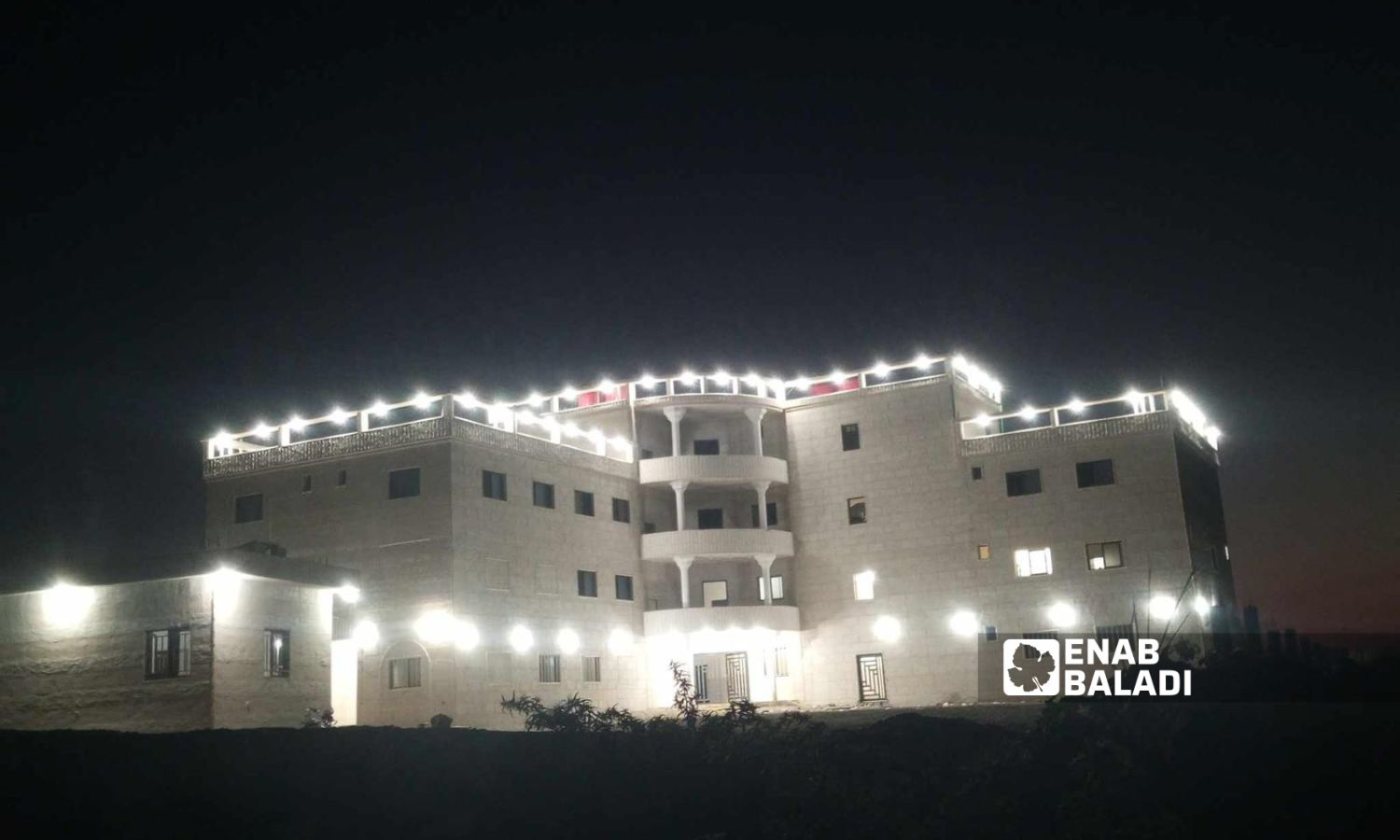



Deir Ezzor – Obadah al-Sheikh
Local actors in the eastern province of Deir Ezzor in general and the town of Al-Sha’fah in particular were able to collect donations to finish the construction phase of Al-Sha’fah Charitable Hospital, pending the completion of its internal equipment and the purchase of the necessary equipment for operation.
An initiative that is the second of its kind in the border town with Iraq within two years after completing the construction of the National Hospital and handing it over to the ruling authority.
The Kurdish-led Autonomous Administration in North and East Syria (AANES) did not complete the preparation and activation of the National Hospital and kept it as it was delivered in August 2022.
The need prompted a number of residents of Al-Sha’fah in the eastern countryside of Deir Ezzor to collect donations from the people of the region at home and abroad, estimated at $270,000 to build the Al-Sha’fah Charitable Hospital, as the construction and cladding works were completed two weeks ago.
A member of the Civil Council and one of the former administrators of the project told Enab Baladi that the hospital was built at the initiative of the people of the region and that it needs to complete its preparations in order to enter service.
The member, who refused to reveal his name for security reasons, explained that he tried to obtain support for the project from international or local organizations or from the Autonomous Administration without the response being achieved.
Walid, a native of the region and one of the workers on the project told Enab Baladi that Al-Sha’fah Hospital was built by benevolent expatriate people in cooperation with the people of Al-Sha’fah without the help of government agencies or local or international organizations.
At the present time, there is no support from any party to complete the hospital’s equipment, which necessitated delivering the voice to interested international and local organizations, he said.
Walid added that there are difficulties in collecting new donations to complete the hospital’s equipment after its construction exhausted all capabilities and funds.
This project is considered one of the most important medical projects in the region, as it could serve, if opened, about 200,000 people from the Hajin region to al-Baghouz, according to Walid.
The project needs medical equipment and cadres in the area, which suffers from a severe shortage of services and cadres.
Patients in and around A-Sha’fah are currently forced to travel long distances to reach a doctor or hospital in light of the economic crisis the country is suffering from.
Enab Baladi met Ali al-Ali, administrator of al-Shuhail Specialized Hospital, who explained that the hospital can cover more than seven villages, namely al-Baghouz, al-Sousa, al-Rashida, al-Arqoub, al-Alayyat, al-Bu Badran and Al-Sha’fah.
The hospital will provide free health services to the residents of these villages in light of the high costs of medical services and surgeries, in addition to the high prices of medicines.
And extending from the Hajin area to the al-Baghouz area, where they are separated by about 40 kilometers, there is only Hajin General Hospital.
According to al-Ali, the Al-Sha’fah region is characterized by a semi-stable security situation, which is an important reason for any organization to assess projects before adopting them.
Al-Ali hopes that the completion of the hospital’s equipment will be approved by a non-governmental organization, given that the Health Committee of the Autonomous Administration provides “limited funds” to hospitals and health centers and is unable to bear the costs and expenses of operating the hospital on its own.
In the event that the initiative to support and operate Al-Sha’fah Hospital by an organization succeeds, this will be a reason for launching similar initiatives in other places, according to al-Ali.
The regions of Deir Ezzor suffer from the lack of organizations operating in the region under the pretext of the deteriorating security situation.
On September 13, 2022, an official in the Health Committee in Deir Ezzor called on international programs and organizations supporting the health sector to provide the Health Committee with the necessary medicines after the spread of the cholera epidemic in the town.
The annual report of the United Nations Office for the Coordination of Humanitarian Affairs (OCHA) documented the health sector crisis in Syria for the year 2022.
The report, issued last January, stated that the health sector is suffering from a crisis, and a large percentage of the centers are either out of service or partially suspended.
The number of people in need of health care has reached 15 million, in addition to 6.9 million displaced people inside Syria and 5.6 million refugees in neighboring countries.
According to the report, the infrastructure of basic health services, such as hospitals and health centers, requires maintenance and rehabilitation.
During the year 2022, the number of hospitals reached 113 throughout Syria, 26% of which are partially operating and 27% are out of service. Out of 1,789 health centers, 21% are partially operating, and 32% are completely out of service.
The devastating magnitude 7.8 earthquake that ravaged northwestern Syria and southern Turkey on Feb. 6, and the spread of epidemics such as cholera and Covid-19, exacerbated the deterioration of the Syrian health sector.
The United Nations World Health Organization (WHO) stated, on February 22, that seven hospitals and about 145 health facilities were damaged in Syria as a result of the earthquake, many of them in northwestern Syria, which is out of the regime control.
if you think the article contain wrong information or you have additional details Send Correction